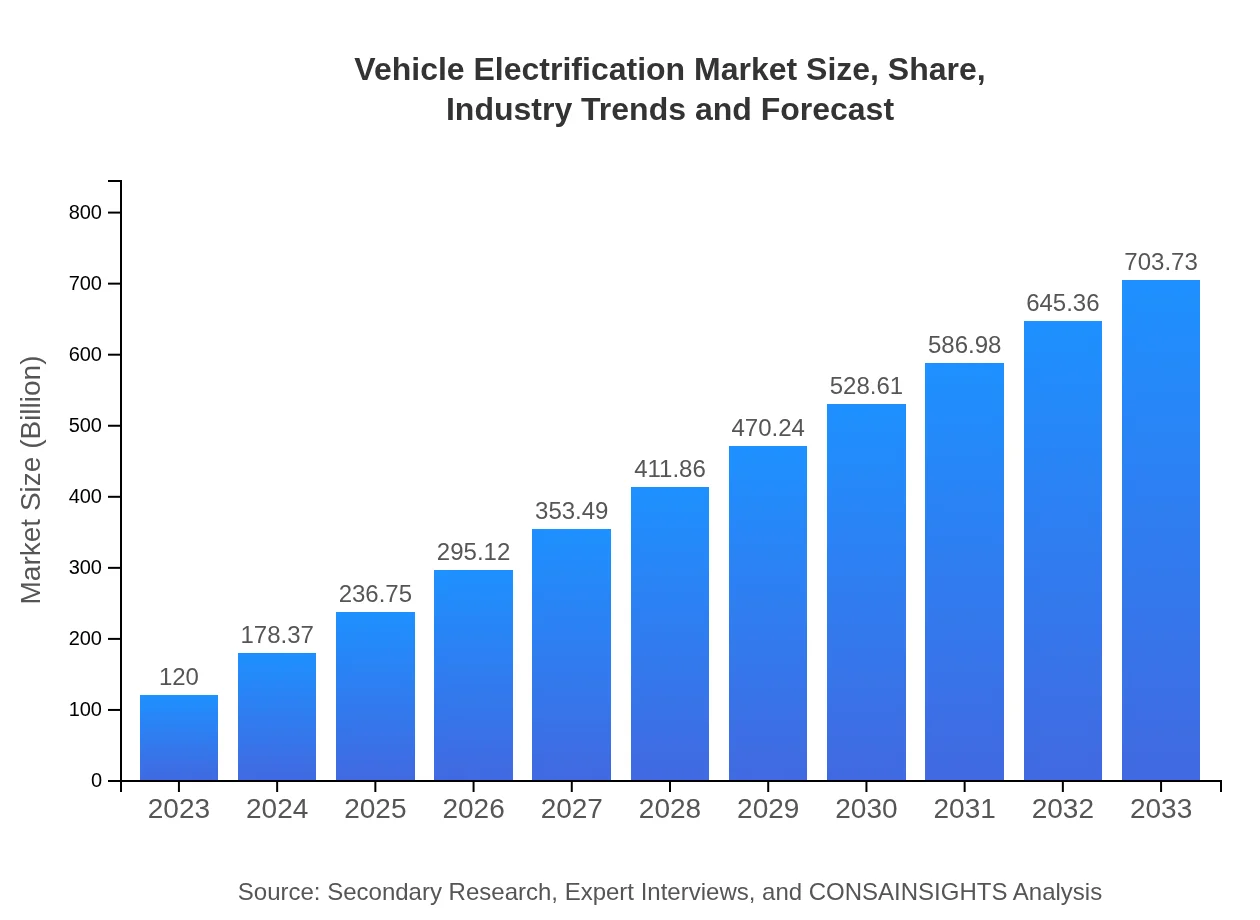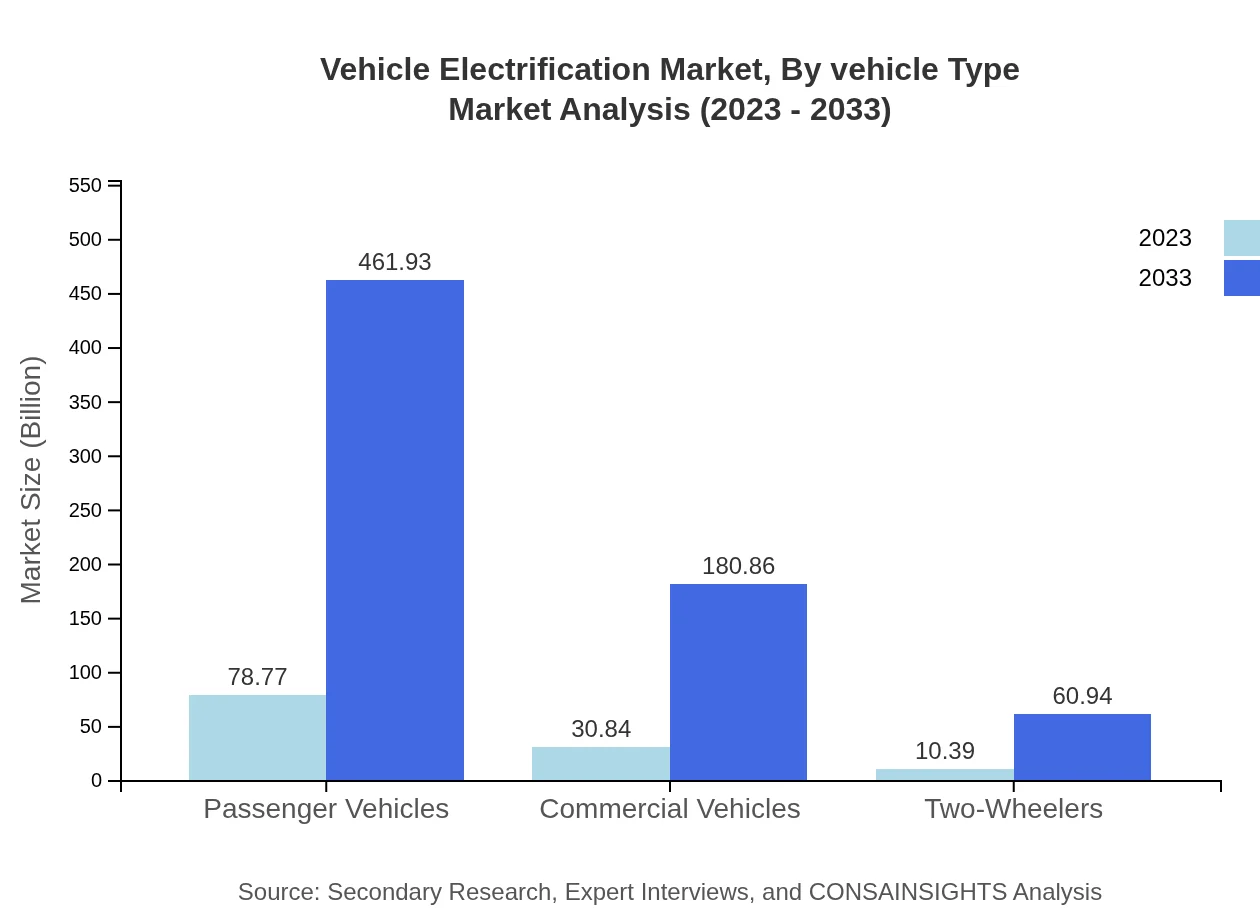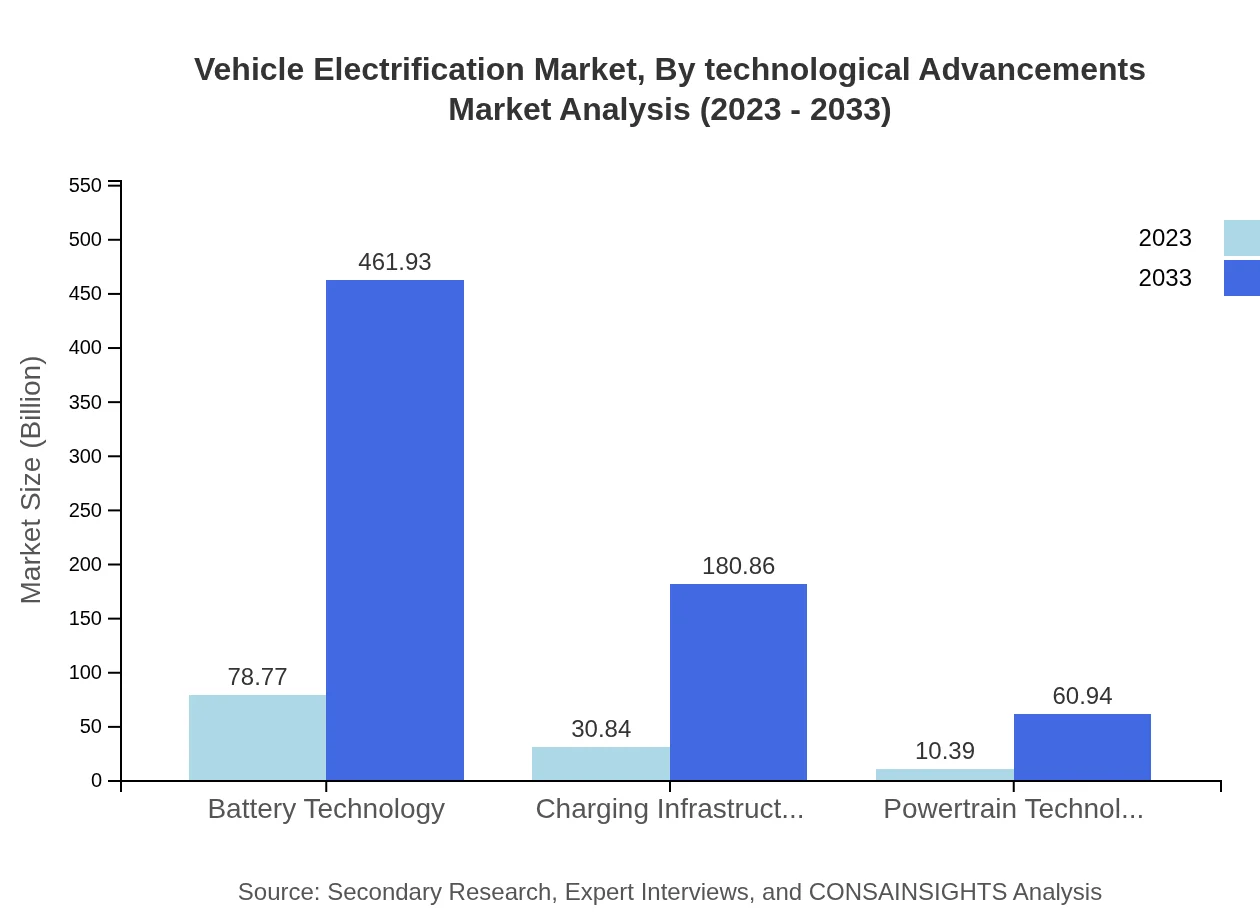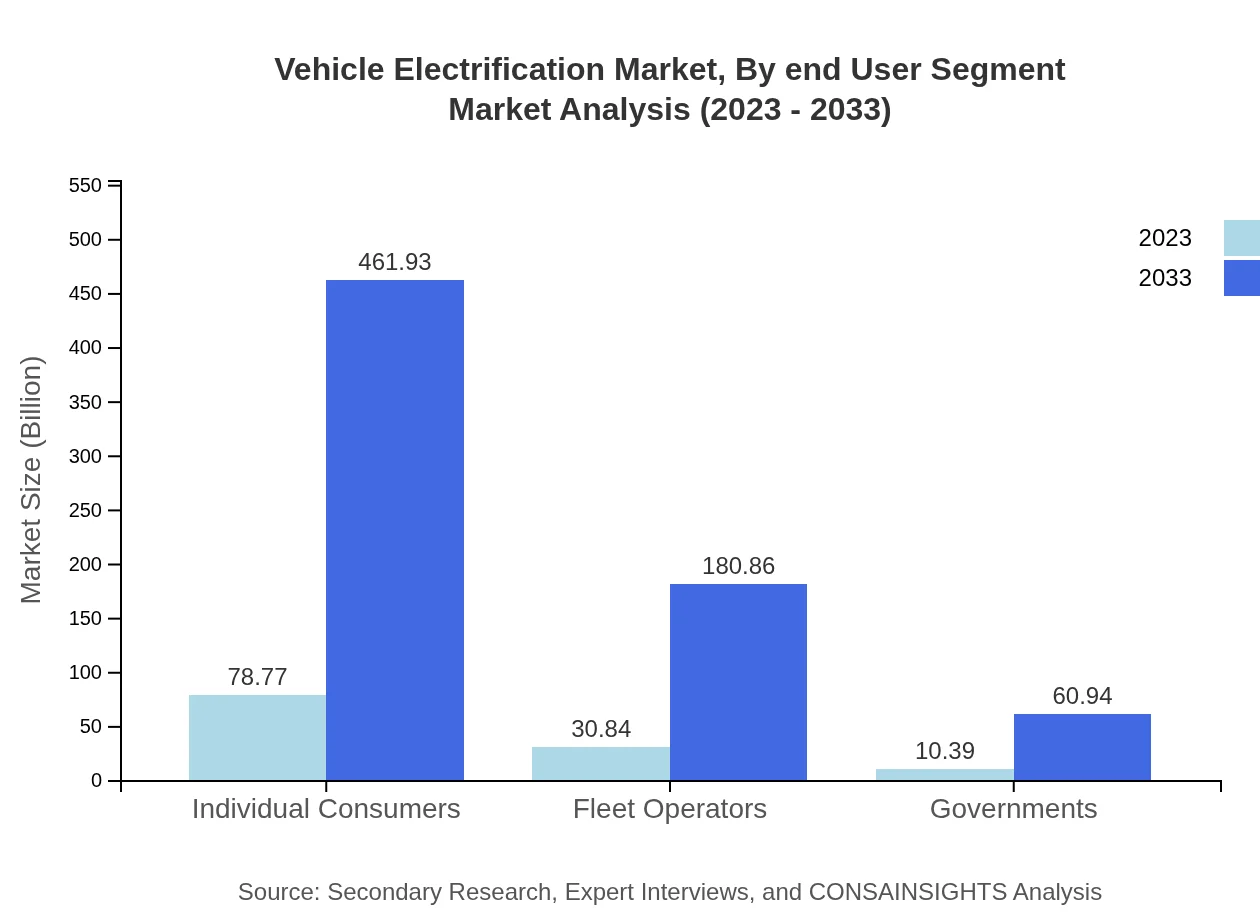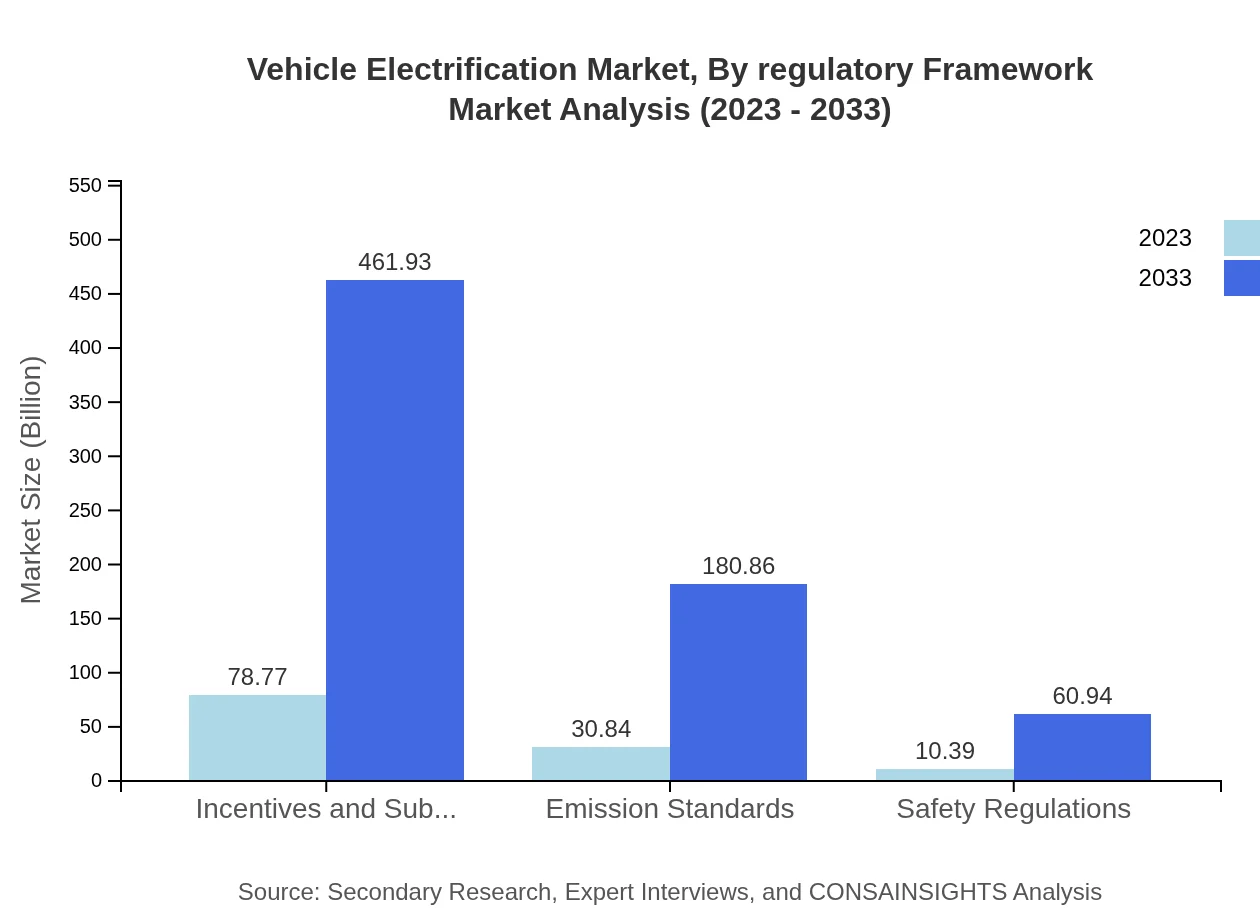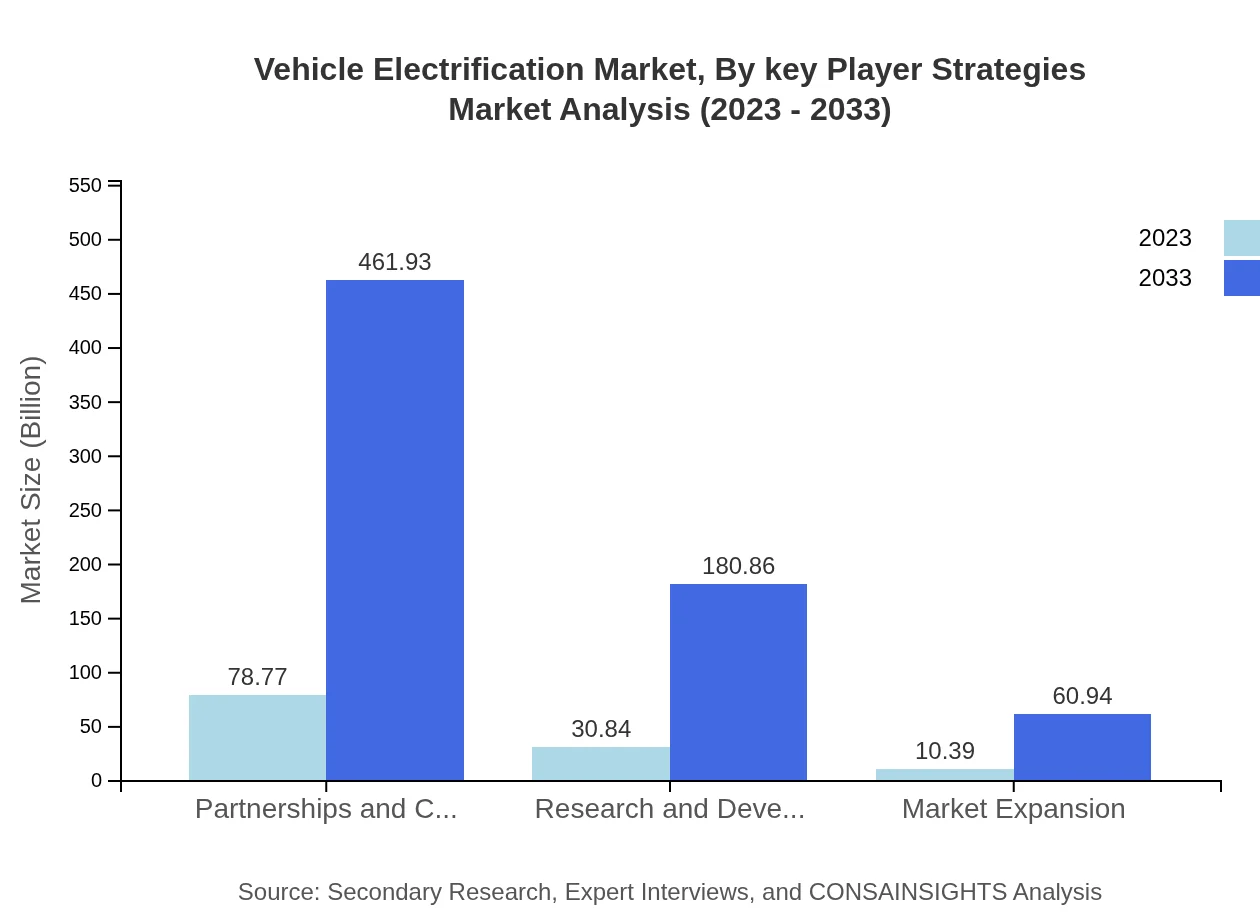Vehicle Electrification Market Report
Published Date: 02 February 2026 | Report Code: vehicle-electrification
Vehicle Electrification Market Size, Share, Industry Trends and Forecast to 2033
This report provides a comprehensive overview of the Vehicle Electrification market, covering key insights and forecasts from 2023 to 2033. It highlights market size, growth rates, regional analyses, industry trends, and competitive landscape, offering a holistic view of the evolving electric vehicle sector.
| Metric | Value |
|---|---|
| Study Period | 2023 - 2033 |
| 2023 Market Size | $120.00 Billion |
| CAGR (2023-2033) | 18.3% |
| 2033 Market Size | $703.73 Billion |
| Top Companies | Tesla, Inc., BYD Company Limited, Nissan Motor Corporation, General Motors Company, BMW AG |
| Last Modified Date | 02 February 2026 |
Vehicle Electrification Market Overview
Customize Vehicle Electrification Market Report market research report
- ✔ Get in-depth analysis of Vehicle Electrification market size, growth, and forecasts.
- ✔ Understand Vehicle Electrification's regional dynamics and industry-specific trends.
- ✔ Identify potential applications, end-user demand, and growth segments in Vehicle Electrification
What is the Market Size & CAGR of Vehicle Electrification market in 2023?
Vehicle Electrification Industry Analysis
Vehicle Electrification Market Segmentation and Scope
Tell us your focus area and get a customized research report.
Vehicle Electrification Market Analysis Report by Region
Europe Vehicle Electrification Market Report:
Europe stands as a frontrunner in the Vehicle Electrification market, with an expected market expansion from $39.22 billion in 2023 to $229.98 billion by 2033. The region's commitment to reducing greenhouse gas emissions drives significant investments in electric mobility initiatives. Nations like Germany, France, and the UK have established policies to support EVs, resulting in increased market competitiveness.Asia Pacific Vehicle Electrification Market Report:
The Asia Pacific region is a key player in the Vehicle Electrification market, with a market size projected to expand from $22.68 billion in 2023 to $133 billion by 2033. Rapid urbanization, government subsidies, and a growing middle-class population drive the demand for electric vehicles in countries such as China and India. Moreover, enhancing charging infrastructure and local manufacturing capabilities further deepen the market penetration of EVs.North America Vehicle Electrification Market Report:
North America is projected to see robust growth, with the market size increasing from $41.87 billion in 2023 to $245.53 billion by 2033. Factors such as stringent emission mandates and rising consumer demand for sustainable transportation options foster substantial growth in this region. The collaboration between automakers and technology firms enhances EV adoption, supplemented by extensive charging networks.South America Vehicle Electrification Market Report:
In South America, the market is expected to grow from $11.41 billion in 2023 to $66.92 billion by 2033. Brazil and Argentina are leading markets, propelled by government incentives and an increasing focus on renewable energy sources. Although the region faces challenges such as economic fluctuations, the awareness of environmental benefits is positively influencing the demand for electric vehicles.Middle East & Africa Vehicle Electrification Market Report:
In the Middle East and Africa, the market size is forecasted to grow from $4.82 billion in 2023 to $28.29 billion by 2033. The demand for electric vehicles is modest but steadily rising, encouraged by emerging government policies aimed at promoting electric mobility. Investment in renewable energy resources and charging infrastructure enhances the market outlook.Tell us your focus area and get a customized research report.
Vehicle Electrification Market Analysis By Vehicle Type
The Vehicle Electrification market is segmented by vehicle type into passenger vehicles, commercial vehicles, and two-wheelers. The passenger vehicle segment dominates the market with a size expected to grow from $78.77 billion in 2023 to $461.93 billion by 2033, reflecting a strong market share of 65.64% each year. Commercial vehicles are also significant, projected to expand from $30.84 billion to $180.86 billion during the same period. Two-wheelers are growing steadily, from $10.39 billion in 2023 to $60.94 billion by 2033, as urban consumers seek more sustainable commuting options.
Vehicle Electrification Market Analysis By Technological Advancements
The technological advancements in the Vehicle Electrification market center primarily on battery technology, charging infrastructure, and powertrain systems. Innovations in battery technology aim to improve energy density, range, and lifespan, driving down costs significantly. Charging infrastructure developments, including fast-charging stations and wireless charging systems, are making electric vehicles more practical for everyday use, while advances in powertrain technology enhance performance and efficiency.
Vehicle Electrification Market Analysis By End User Segment
The end-user segment of the Vehicle Electrification market includes individual consumers, fleet operators, and governments. Individual consumers form the largest part of the market, with a wide array of products aligning with their mobility needs. Fleet operators are increasingly recognizing the cost savings associated with electric vehicle deployment, while government bodies push for electric vehicle programs and initiatives to meet environmental targets.
Vehicle Electrification Market Analysis By Regulatory Framework
Regulatory frameworks play a pivotal role in the Vehicle Electrification landscape. Stricter emissions standards, vehicle incentives, and investment in charging infrastructure are encouraging numerous stakeholders to adopt electric vehicles. Worldwide, countries are rolling out policies that support electric mobility to comply with agreements aimed at reducing greenhouse gas emissions.
Vehicle Electrification Market Analysis By Key Player Strategies
Key players in the Vehicle Electrification market are implementing various strategies to enhance their market presence. These strategies include forming strategic alliances, investing in research and development for innovative EV technologies, and expanding their product portfolios to meet diverse consumer needs. Market leaders are also focusing on sustainable practices, integrating renewable energy solutions into their offerings to reinforce their position in a competitive market.
Vehicle Electrification Market Trends and Future Forecast
Tell us your focus area and get a customized research report.
Global Market Leaders and Top Companies in Vehicle Electrification Industry
Tesla, Inc.:
Tesla is recognized as a leading manufacturer and innovator of electric vehicles and energy solutions, pioneering high-performance EV technology and battery systems.BYD Company Limited:
BYD specializes in electric vehicles and batteries, with extensive R&D capabilities and a commitment to promoting renewable energy sources.Nissan Motor Corporation:
Nissan has a strong foothold in the electric vehicle market with the Nissan Leaf, contributing significantly to affordable EV options globally.General Motors Company:
General Motors is transitioning toward electric mobility, committing to an all-electric future and significantly investing in EV technologies.BMW AG:
BMW's focus on electric and hybrid models reflects its commitment to sustainability, with ongoing development in battery and drivetrain technologies.We're grateful to work with incredible clients.









FAQs
What is the market size of vehicle Electrification?
The vehicle electrification market was valued at approximately $120 billion in 2023, with a robust CAGR of 18.3% projected until 2033.
What are the key market players or companies in the vehicle Electrification industry?
Key players in the vehicle electrification industry include major automotive manufacturers, technology firms focusing on battery technology, and charging infrastructure providers, among others.
What are the primary factors driving the growth in the vehicle Electrification industry?
Driving factors include government incentives for electric vehicles, advancements in battery technologies, growing environmental awareness, and stringent emission regulations prompting a shift towards electrification.
Which region is the fastest Growing in the vehicle Electrification?
The North American region is the fastest-growing for vehicle electrification, with a market projected to reach $245.53 billion by 2033, growing significantly from $41.87 billion in 2023.
Does ConsaInsights provide customized market report data for the vehicle Electrification industry?
Yes, ConsaInsights offers tailored market report data for the vehicle electrification sector, allowing clients to obtain specific insights and analyses relevant to their needs.
What deliverables can I expect from this vehicle Electrification market research project?
Deliverables typically include an in-depth market analysis report, detailed segmentation insights, trend forecasting, and strategic recommendations specific to the vehicle electrification market.
What are the market trends of vehicle Electrification?
Current trends in vehicle electrification highlight increased investment in R&D for battery technology, rising consumer demand for electric vehicles, growing charging infrastructure, and new partnerships fostering innovation.

